This page contains setup and usage information for the Intel® Compute Stick STK2mv64CC and STK2m364CC.
Click or the topic for details:
Product Description
| Symbol | Description |
| HDMI* | HDMI connector |
 | Power button |
| Power LED | Power LED—blue |
 | USB 3.0 port |
| Security | Security cable opening |
| MicroSD* | MicroSD memory card slot |
 | Power connector |
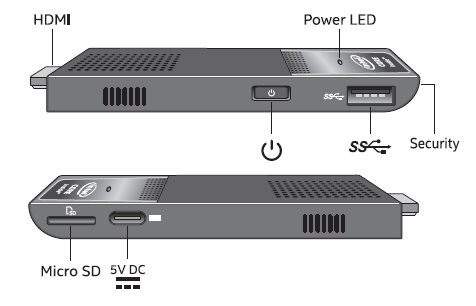
Choose the Power Plug
Select the power plug attachment for your region. All plug attachments may not be included in the box.
| Country | Plug Attachment |
| United States, Japan |  |
| United Kingdom |  |
| Argentina | 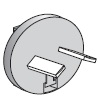 |
| Australia |  |
| China | 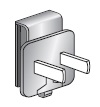 |
| European Union | 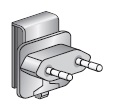 |
| India | 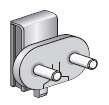 |
| South Korea |  |
Slide the plug attachment onto the power adapter.
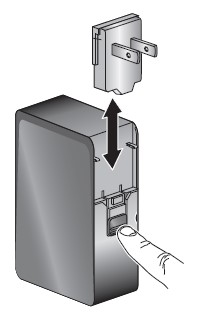
You must use the included power adapter and cable to power the Intel® Compute Stick. Use of any other power adapter, power source, or cable isn't supported.
Connect a Keyboard and Mouse
Intel® Compute Stick supports any of the following:
| USB wired keyboard (A) and mouse (B), connected to the ports on the power adapter. | 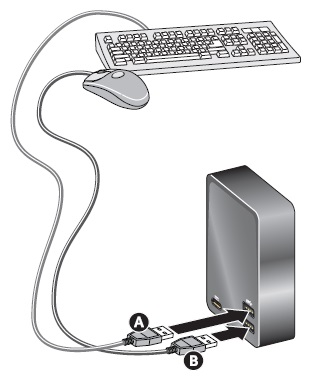 |
| USB wireless keyboard and mouse, using a USB dongle. | 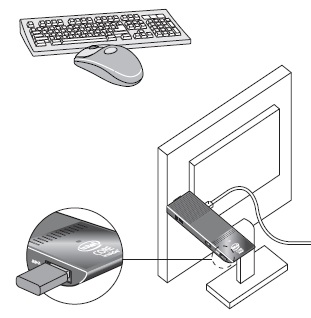 |
| Bluetooth® keyboard and mouse. Follow the instructions that came with the keyboard and mouse, to pair them to the Intel Compute Stick’s onboard Bluetooth device. To pair Bluetooth devices, you may need to temporarily connect a wired mouse and keyboard to the Intel Compute Stick. | 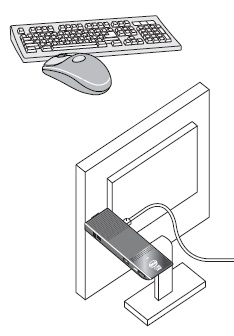 |
| Note | Keyboard and mouse aren't included. |
Find compatible keyboards and mice at the Intel Product Compatibility Tool for:
Connect Directly to a Display
Plug the Intel® Compute Stick directly into a standard HDMI port on a television or monitor. The Intel Compute Stick extends about 4.5 inches (113 mm) out from the HDMI port.
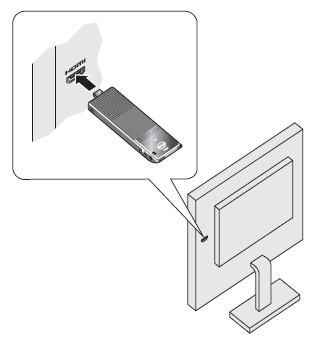
Connect to a Display with the HDMI Extender Cable
Use the flexible HDMI extender cable that came in the box, if there is limited space around the HDMI port of the television or monitor.
- Plug the Intel Compute Stick into the female end of the extender cable (A).
- Plug the male end of the extender cable into the HDMI port. Find the HDMI port on the television or monitor (B).
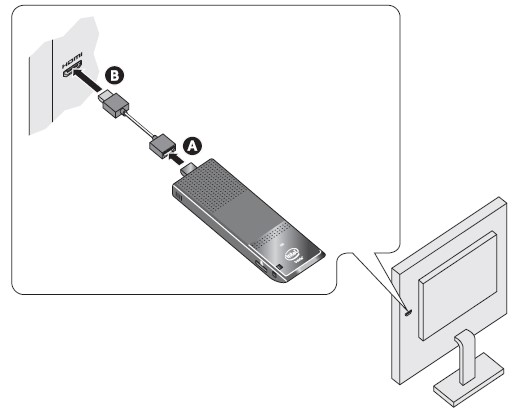
Find compatible televisions and monitors at the Intel Product Compatibility Tool for:
Powering the Device
Connect the power cable (A) to the power adapter. Plug the power adapter into an AC power source (B). Connect the power cable (C) to the Intel® Compute Stick as shown.
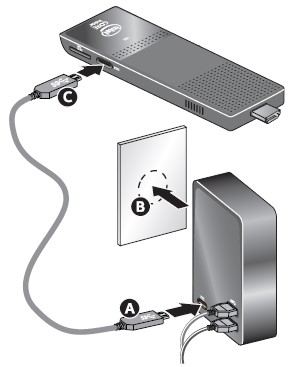
The Intel Compute Stick boots up automatically when you apply power.
Turn off the Intel Compute Stick using the normal shutdown process for Windows*.
To perform subsequent power-ups, press the power button on the side of the Intel Compute Stick.
| Note | The Intel Compute Stick is designed to use up to 10W of power. USB ports on televisions or monitors do not supply enough power for the Intel Compute Stick. If you try to use a USB port on the television to power the Intel Compute Stick, here are the likely symptoms:
|
Use the USB 3.0 Port
Use the USB 3.0 port to:
- Install software from a CD or DVD in a USB optical drive.
- Back up or access media files (such as music and photos) on an external USB drive.
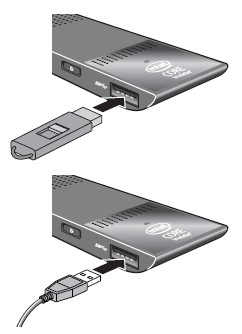
| Note | USB drive and USB cable aren't included. |
Find compatible USB devices at the Intel Product Compatibility Tool for:
Use the MicroSD* Card Port
The Intel® Compute Stick supports MicroSD card sizes from 8 GB to 128 GB.
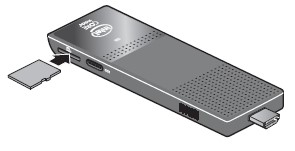
| Note | MicroSD card isn't included. |
Find compatible microSD cards at the Intel Product Compatibility Tool for:
Secure the Intel® Compute Stick
Install a security cable loop in the security opening. Find the opening on the edge of the Intel® Compute Stick. The security opening is 3 mm × 3 mm.
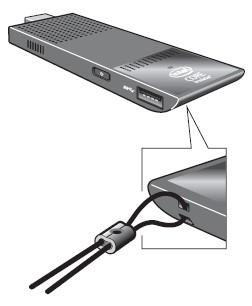
| Note | A security cable loop is not included. You can build one by inserting a length of a wire rope (<3mm) through the security opening and then crimp the ends together with a cable sleeve. |

Install an Operating System
For a list of Intel®-validated operating systems, see Supported Operating System.
Keep BIOS and Drivers Current
BIOS
The latest BIOS updates are available on Intel® Download Center:
Refer to BIOS Update Instructions for information on updating the Intel Compute Stick's BIOS.
Drivers
Graphics, wireless, and Bluetooth® drivers are available on Download Center:
The graphics driver package includes HDMI audio drivers.
Windows Updates* may install driver updates automatically.